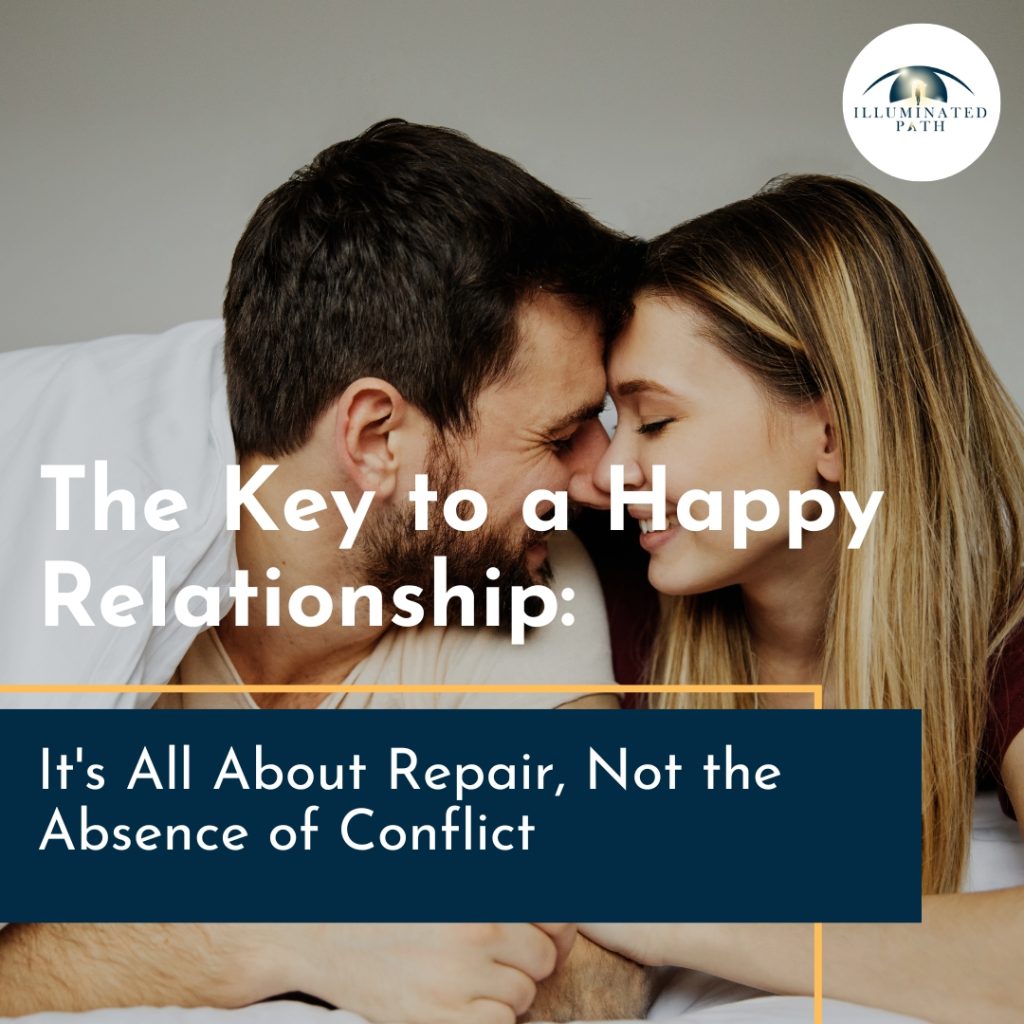The Key to a Happy Relationship: It’s All About Repair, Not the Absence of Conflict

In the world of relationships, conflict is inevitable. Even the happiest couples argue, but what sets thriving relationships apart is how partners handle disagreements. John Gottman, a renowned psychologist and relationship expert, encapsulates this truth with his famous quote: “The key to a happy relationship is not the absence of conflict, but how you repair it.” This idea is more than just philosophical—research backs it up with compelling data. Gottman’s studies, conducted at the University of Washington, have shown that 69% of conflicts in relationships are perpetual problems, stemming from fundamental differences in personality, needs, or preferences. The real test of a relationship isn’t whether couples argue but whether they engage in repair attempts to resolve or manage these differences effectively. The Science of Repair Attempts Gottman’s research also revealed that couples who remain together happily over the long term excel in what he calls “repair attempts”—small actions or communications used to de-escalate tension and reconnect during or after a conflict. These repairs can be as simple as: Apologizing sincerely. Using humor to lighten the mood. Acknowledging the other person’s feelings. Suggesting a break to cool down before resuming the discussion. Couples who succeed in these repair attempts are significantly more likely to report high satisfaction in their relationships. According to Gottman, successful repair attempts predict relationship longevity with over 80% accuracy. Why Repair Matters More Than Harmony The misconception that happy couples never fight can create unrealistic expectations. The truth is that conflict can be healthy—it often signals areas where partners need to grow together. What matters is how couples use conflict to build understanding, intimacy, and trust. Repair attempts are a cornerstone of this process. Dr. Sue Johnson, the founder of Emotionally Focused Therapy, adds another layer to this insight:“Emotional bonds deepen when partners repair emotional injuries and reaffirm their commitment to each other.” This aligns perfectly with Gottman’s findings, emphasizing that the process of repair builds resilience in relationships. Practical Steps for Better Repair Attempts If you want to strengthen your relationship, consider these strategies: Pause and Reflect: Avoid letting emotions drive reactive responses during an argument. Take a moment to breathe and reflect on what your partner might be feeling. Express Vulnerability: A simple “I feel hurt because…” can open a dialogue rather than escalate conflict. Practice Active Listening: Repeat back what your partner says to show you understand, even if you disagree. Use Humor Sparingly: Laughter can be a great repair tool, but only if it feels respectful and well-timed. Revisit the Conflict: Not all issues can be resolved in the heat of the moment. Commit to discussing difficult topics later when both partners are calmer. Final Thoughts Conflict doesn’t have to be the enemy of a healthy relationship. When couples focus on repairing rather than avoiding disagreements, they create a stronger, more resilient bond. Gottman’s work reminds us that it’s not about perfection or harmony but about mutual effort and care. As you navigate your relationship, remember this truth: it’s not the absence of conflict but the presence of repair that determines your happiness together. By mastering repair attempts, you can turn conflict into a tool for connection and growth. The Author Dr. Shadi Souferian Psy. D. Licensed Clinical Psychologist Therapist And Psychologist in Los Angeles And Beverly Hills. You might also enjoy this article: The Key to a Happy Relationship: It’s All About Repair, Not the Absence of Conflict November 21, 2024By:Dr. Shadi Souferian, Psy.DRelationshipStress Management0Comments In the world of relationships, conflict is inevitable. Even the happiest couples argue, but what…Read more Finding Peace in the Present: Letting Go of “Should” and Managing Stress October 28, 2024By:Dr. Shadi Souferian, Psy.DPersonal DevelopmentStress Management0Comments our struggle to accept reality as it is often lies at the root of our…Read more Embracing Imperfection: A Path to Empathy and Acceptance October 17, 2024By:Dr. Shadi Souferian, Psy.DRelationshipCouple RelationshipMarriage0Comments Imperfection is a universal human experience. Yet, many of us strive for unattainable standards of…Read more Relationship Roadblocks? Your Attachment Style Might Be the Key October 10, 2024By:Dr. Shadi Souferian, Psy.DRelationshipCouple RelationshipMarriage0Comments Do you ever find yourself wondering why you react the way you do in relationships?…Read more Is Marriage Counseling Right for Us? Signs It Might Be Time to Seek Help October 4, 2024By:Dr. Shadi Souferian, Psy.DRelationshipCouple RelationshipMarriage0Comments Marriage, a journey filled with love, laughter, and shared dreams, can also be a rollercoaster…Read more Hidden Scars: Unmasking the Impact of Childhood Trauma October 2, 2024By:Dr. Shadi Souferian, Psy.DTraumaChildhoodTrauma0Comments The weight of childhood trauma settles on the soul like an invisible cloak, its presence…Read more
Embracing Imperfection: A Path to Empathy and Acceptance

Imperfection is a universal human experience. Yet, many of us strive for unattainable standards of perfection, leading to self-criticism, anxiety, and even social isolation. Recognizing and embracing our imperfections can be a transformative journey, fostering self-acceptance, empathy, and stronger relationships. This article will explore the benefits of embracing imperfection, drawing on research and personal anecdotes. The Prevalence of Perfectionism Perfectionism, the relentless pursuit of flawlessness, is a common trait. Studies have shown that a significant portion of the population grapples with perfectionistic tendencies. For instance, a study published in the Journal of Personality and Social Psychology found that over 50% of college students reported experiencing perfectionistic thoughts and behaviors. Source: Neff, K. D., & Morris, R. D. (2009). Self-compassion and perfectionism: A meta-analysis. Journal of Personality and Social Psychology, 97(1), 151-170. The Negative Impacts of Perfectionism Perfectionism can have detrimental effects on mental health and well-being. Research has linked perfectionism to higher rates of depression, anxiety, stress, and eating disorders. Additionally, perfectionists may struggle with procrastination, low self-esteem, and difficulty forming satisfying relationships. Source: Stoeber, J., & Frandsen, K. J. (2011). Perfectionism and mental health: A meta-analysis. Journal of Personality and Social Psychology, 101(3), 494-511. The Benefits of Embracing Imperfection Recognizing and accepting our imperfections can lead to numerous benefits, including: Increased self-acceptance: Embracing imperfection helps us to see ourselves as whole and complete, rather than as a collection of flaws. This can lead to increased self-esteem and a more positive body image. Reduced stress and anxiety: Perfectionism often involves excessive self-criticism and a constant fear of failure. By accepting our imperfections, we can reduce our stress and anxiety levels. Improved relationships: When we are more accepting of ourselves, we are also more likely to be accepting of others. This can lead to stronger, more fulfilling relationships. Enhanced creativity and innovation: Perfectionism can stifle creativity and innovation. By embracing imperfection, we can free ourselves from the fear of making mistakes and explore new ideas with greater confidence. How to Embrace Imperfection Embracing imperfection is a journey, not a destination. Here are some strategies to help you on your path: Practice self-compassion: Treat yourself with kindness and understanding, just as you would treat a friend. Challenge perfectionistic thoughts: When you find yourself thinking negatively about your imperfections, challenge those thoughts with evidence to the contrary. Set realistic goals: Instead of striving for perfection, set achievable goals that are aligned with your values and abilities. Celebrate your successes: Acknowledge and celebrate your accomplishments, no matter how small. Seek support: Connect with a life coach or support group for individuals working on self-acceptance and embracing imperfection. Sharing your experiences with others who understand your challenges can be a powerful source of support and inspiration. Case Study: The Journey of a Perfectionist To illustrate the transformative power of embracing imperfection, let’s consider the story of Sarah, a young woman who struggled with perfectionism for years. Sarah was constantly striving for perfection in her academic work, her relationships, and her appearance. This relentless pursuit of flawlessness led to significant stress, anxiety, and feelings of inadequacy. Sarah’s journey towards self-acceptance began with a conscious decision to challenge her perfectionistic thoughts. She started to notice how these thoughts often led to feelings of shame and self-doubt. Instead of believing these negative thoughts, Sarah began to question their validity and seek alternative perspectives. Over time, Sarah learned to practice self-compassion. She treated herself with kindness and understanding, recognizing that everyone makes mistakes and that it’s okay to be imperfect. She also began to set more realistic goals for herself, focusing on progress rather than perfection. As Sarah continued to embrace her imperfections, she experienced a significant reduction in stress and anxiety. She also found that her relationships with others became more fulfilling. By being more accepting of herself and others, Sarah was able to build stronger connections and create a more supportive social network. The Role of Mindfulness in Embracing Imperfection Mindfulness, the practice of paying attention to the present moment without judgment, can be a powerful tool for embracing imperfection. By cultivating mindfulness, we can become more aware of our thoughts and feelings, and learn to respond to them with greater compassion and acceptance. Several studies have demonstrated the benefits of mindfulness for individuals struggling with perfectionism. For example, a study published in the Journal of Cognitive Therapy and Research found that mindfulness-based interventions can help reduce perfectionistic thoughts and behaviors. Source: Baer, R. A., Smith, A. C., Lykins, M., & Allen, J. G. (2011). Mindfulness-based interventions for perfectionism: A review. Journal of Cognitive Therapy and Research, 35(1), 1-16. The Impact of Embracing Imperfection on Society Embracing imperfection can have a profound impact on society as a whole. When we are more accepting of our own imperfections, we are also more likely to be accepting of others. This can lead to a more compassionate and inclusive society, where everyone feels valued and respected. Additionally, embracing imperfection can inspire others to do the same. By sharing our own stories of vulnerability and self-acceptance, we can create a ripple effect of positive change. Conclusion Embracing imperfection is a journey that requires courage, self-compassion, and a willingness to let go of unrealistic expectations. By recognizing and accepting our flaws, we can experience increased self-esteem, reduced stress, improved relationships, and a greater sense of peace and fulfillment. As we continue to navigate the complexities of life, let us remember that it is okay to be imperfect. By embracing our imperfections, we can create a more compassionate, understanding, and authentic world for ourselves and others. Additional Considerations: The role of cultural influences on perfectionism: Different cultures may have varying expectations and attitudes towards perfection. Understanding these cultural differences can help us to appreciate the diversity of human experiences. The importance of self-care: Embracing imperfection often involves taking care of ourselves both physically and emotionally. This may include engaging in activities that promote relaxation, well-being, and personal growth. The connection between embracing imperfection and social justice: By challenging perfectionistic norms, we can
Relationship Roadblocks? Your Attachment Style Might Be the Key

Do you ever find yourself wondering why you react the way you do in relationships? Or maybe why your partner seems to have a completely different approach to intimacy and connection? The answer might lie in your attachment styles. Attachment theory, developed by John Bowlby and Mary Ainsworth, suggests that our early childhood experiences with caregivers shape the way we form bonds with others in adulthood. These patterns of behavior are known as attachment styles. The Four Attachment Styles: Secure: Individuals with a secure attachment style feel comfortable with intimacy and independence. They are able to express their needs and emotions openly, and they trust their partners. Anxious-Preoccupied: Those with an anxious-preoccupied attachment style crave intimacy and fear abandonment. They may become overly dependent on their partners and seek constant reassurance. Dismissive-Avoidant: People with a dismissive-avoidant attachment style value independence and tend to suppress their emotions. They may avoid intimacy and have difficulty committing to relationships. Fearful-Avoidant: Individuals with a fearful-avoidant attachment style desire intimacy but fear getting hurt. They may have a history of trauma or abuse, which makes it difficult for them to trust others. How Attachment Styles Impact Relationships: Your attachment style can significantly influence your relationship dynamics. For example: Communication: Securely attached individuals are generally good communicators, while those with insecure attachment styles may struggle to express their needs or understand their partner’s perspective. Conflict resolution: Secure partners tend to approach conflict constructively, while insecure partners may become defensive or withdraw. Intimacy: Secure individuals are comfortable with intimacy, while those with insecure attachment styles may have difficulty with closeness or vulnerability. Discovering Your Attachment Style: Reflecting on your past relationships and current behaviors can provide clues about your attachment style. You can also take online quizzes or seek professional guidance from a couple and relationship therapist. Improving Your Relationships: Understanding your attachment style and your partner’s can be a game-changer for your relationship. It can help you: Increase self-awareness: Recognize your own patterns and triggers. Improve communication: Learn to express your needs and understand your partner’s perspective. Develop empathy: Appreciate the challenges your partner may be facing based on their attachment style. Build trust: Create a safe and secure space for emotional connection. By understanding your attachment style and its impact on your relationships, you can unlock the key to deeper connection and lasting love. This journey of self-discovery might not always be easy. It requires introspection, courage, and a willingness to confront past hurts and ingrained patterns. But the rewards are immeasurable. As you gain a deeper understanding of yourself and your partner, you’ll be equipped to navigate challenges with greater empathy and compassion. You’ll learn to communicate more effectively, build stronger bonds of trust, and cultivate a love that is truly secure and fulfilling. Remember, personal growth is an ongoing process, and every step you take towards secure attachment brings you closer to experiencing the loving, fulfilling relationships you deserve. So, embrace this journey of self-discovery and watch your relationships blossom in ways you never thought possible. The Author Dr. Shadi Souferian Psy. D. Licensed Clinical Psychologist Therapist And Psychologist in Los Angeles And Beverly Hills. You might also enjoy this article: Relationship Roadblocks? Your Attachment Style Might Be the Key October 10, 2024By:Dr. Shadi Souferian, Psy.DRelationshipCouple RelationshipMarriage0Comments Do you ever find yourself wondering why you react the way you do in relationships?…Read more Is Marriage Counseling Right for Us? Signs It Might Be Time to Seek Help October 4, 2024By:Dr. Shadi Souferian, Psy.DRelationshipCouple RelationshipMarriage0Comments Marriage, a journey filled with love, laughter, and shared dreams, can also be a rollercoaster…Read more Hidden Scars: Unmasking the Impact of Childhood Trauma October 2, 2024By:Dr. Shadi Souferian, Psy.DTraumaChildhoodTrauma0Comments The weight of childhood trauma settles on the soul like an invisible cloak, its presence…Read more Finding Meaning in Life’s Transformations: Embracing Change with the Help of Psychology September 25, 2024By:Dr. Shadi Souferian, Psy.DLife TransformationLifetransition0Comments Life is a symphony composed with notes of joy, sorrow, triumph, and challenge. It’s a…Read more Anxiety and Relationships: Communication and Understanding – The Statistical Picture September 19, 2024By:Dr. Shadi Souferian, Psy.DRelationship0Comments Anxiety disorders, with their pervasive reach, impact a significant portion of the population, casting a…Read more How Couples Therapy Can Strengthen Your Bond: A Path to Lasting Love September 18, 2024By:Dr. Shadi Souferian, Psy.DRelationship0Comments Maintaining a fulfilling and harmonious relationship requires ongoing effort and dedication. Even the most devoted…Read more
Is Marriage Counseling Right for Us? Signs It Might Be Time to Seek Help

Marriage, a journey filled with love, laughter, and shared dreams, can also be a rollercoaster ride of challenges, disagreements, and unexpected hurdles. While every couple faces bumps along the road, sometimes those bumps become mountains, leaving you feeling lost, disconnected, and unsure of how to navigate the path forward. If you find yourself relating to this, you’re not alone. Many couples reach a point where they wonder, “Is marriage counseling right for us?” This article delves into the benefits of marriage counseling, explores common reasons couples seek help, and offers a checklist of red flags that indicate professional support could be beneficial. The Power of Professional Guidance Marriage counseling, also known as couples therapy, provides a safe and supportive space for couples to address challenges, improve communication, and strengthen their bond. Think of it as a tune-up for your relationship, guided by a trained professional who can offer objective insights and evidence-based tools. Here’s how marriage counseling can help: Improved Communication: A skilled therapist can help you identify communication patterns that are hindering your relationship and teach you healthier ways to express your needs and resolve conflicts. Increased Empathy and Understanding: Counseling fosters a deeper understanding of each other’s perspectives, emotions, and underlying needs, leading to increased empathy and compassion. Rebuilding Trust: If trust has been broken due to infidelity, betrayal, or other issues, therapy can provide a framework for rebuilding trust through honesty, accountability, and forgiveness. Conflict Resolution Skills: Learn effective strategies for managing disagreements constructively, finding common ground, and reaching mutually satisfying solutions. Rekindling Intimacy: Therapy can help you address issues that are affecting your emotional and physical intimacy, reigniting the spark and deepening your connection. Navigating Life Transitions: Whether it’s adjusting to parenthood, dealing with a career change, or coping with aging parents, counseling can provide support and guidance during significant life transitions. But does marriage counseling work? Research suggests that it can be highly effective. A study published in the Journal of Consulting and Clinical Psychology found that 70% of couples who participated in marriage counseling reported significant improvements in their relationship satisfaction. (Baucom, D. H., Shoham, V., Mueser, K. T., Daiuto, A. D., & Stickle, T. R. (1998). Empirically supported couple and family interventions for marital distress and adult mental health problems. Journal of Consulting and Clinical Psychology, 66(1), 53-88.) Why Do Couples Seek Marriage Counseling? Couples seek counseling for a wide range of reasons, and there’s no “one size fits all” answer. Here are some of the most common issues that bring couples to therapy: Communication Problems: Difficulty expressing needs, constant arguing, feeling unheard or misunderstood. Infidelity: Dealing with the aftermath of an affair, rebuilding trust, and addressing underlying issues. Loss of Intimacy: Decreased emotional and/or physical connection, lack of affection, feeling distant. Financial Stress: Disagreements about money management, differing financial goals, financial infidelity. Parenting Conflicts: Differing parenting styles, disagreements about discipline, challenges with blended families. Life Transitions: Adjusting to major life changes such as marriage, parenthood, empty nest, retirement, or illness. Mental Health Concerns: Dealing with depression, anxiety, trauma, or other mental health challenges that are impacting the relationship. Substance Abuse: Addressing the impact of addiction on the relationship and supporting recovery. It’s important to remember that seeking help is a sign of strength, not weakness. It shows a commitment to your relationship and a willingness to invest in its future. Red Flags: Is it Time to Consider Counseling? While every relationship has its ups and downs, certain warning signs may indicate that professional help is needed. Here’s a checklist of red flags to consider: Communication and Conflict: Constant Arguing: Frequent disagreements that escalate quickly and rarely reach a resolution. Stonewalling or Withdrawal: One or both partners shut down during conflict, refusing to communicate or engage. Criticism and Contempt: Regularly expressing criticism, sarcasm, or hostility towards each other. Defensiveness: Inability to take responsibility for actions or acknowledge the other person’s perspective. Emotional Connection: Feeling Distant and Disconnected: Lack of emotional intimacy, feeling like roommates rather than partners. Loss of Affection: Decreased physical touch, lack of intimacy, and expressions of love. Lack of Trust: Suspicion, jealousy, or difficulty believing each other. Feeling Lonely in the Relationship: Experiencing a sense of isolation and lack of support from your partner. Behavioral Patterns: Considering or Threatening Separation/Divorce: Frequently discussing or thinking about ending the relationship. Infidelity (Emotional or Physical): Engaging in intimate relationships outside of the marriage. Substance Abuse: Using drugs or alcohol to cope with relationship problems. Domestic Violence (Physical, Emotional, or Verbal): Any form of abuse is unacceptable and requires immediate professional intervention. If you recognize several of these red flags in your relationship, it’s crucial to seek help sooner rather than later. The longer issues fester, the more difficult they can be to address. Taking the First Step Deciding to pursue marriage counseling can be a significant step, but it doesn’t have to be overwhelming. Here are some tips for getting started: Talk to your partner: Openly and honestly discuss your concerns and why you think counseling might be helpful. Find a qualified therapist: Look for a licensed marriage and family therapist (LMFT) with experience in addressing your specific concerns. Be prepared to invest time and effort: Counseling requires commitment and active participation from both partners. Approach therapy with an open mind: Be willing to be vulnerable, honest, and open to new perspectives. Remember, seeking help is a sign of strength and a commitment to your relationship. With the right support and guidance, you can navigate challenges, strengthen your bond, and create a more fulfilling future together. The Author Dr. Shadi Souferian Psy. D. Licensed Clinical Psychologist Therapist And Psychologist in Los Angeles And Beverly Hills. You might also enjoy this article: Hidden Scars: Unmasking the Impact of Childhood Trauma – Copy October 4, 2024By:RyoTraumaChildhoodTrauma0Comments Marriage, a journey filled with love, laughter, and shared dreams, can also be a rollercoaster…Read more Hidden Scars: Unmasking the Impact of Childhood Trauma October 2, 2024By:Dr. Shadi Souferian, Psy.DTraumaChildhoodTrauma0Comments The weight of childhood trauma settles
